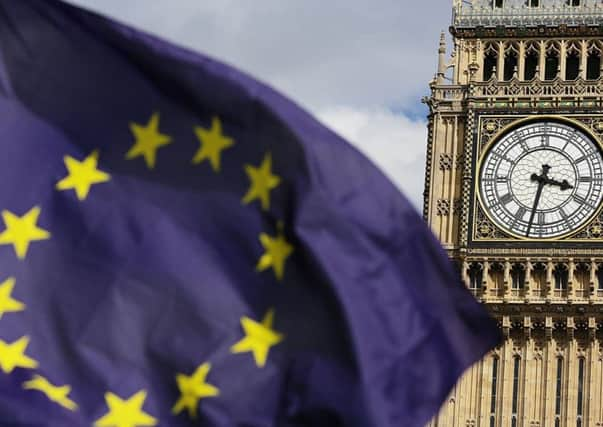Report: Brexit has '˜deepened divisions' in Northern Ireland and Scotland


A new research paper has examined the impact of Brexit on the two nations of the United Kingdom which voted to remain in the European Union in the 2016 referendum.
Experts Dr Kirsty Hughes and Dr Katy Hayward said the Brexit process had “deepened political divisions” in both Scotland and Northern Ireland.
Advertisement
Hide AdAdvertisement
Hide AdThey warned these tensions could be “further exacerbated” if Britain fails to reach a deal with the other European nations over its departure.
The paper highlighted a “striking similarity” between Scotland and Northern Ireland, saying in both nations “political parties’ stances on Brexit have deepened existing divisions”.
In Northern Ireland, Sinn Fein supports unification and opposes Brexit while the Democratic Unionist Party (DUP) supports the Union with the UK and Brexit.
Meanwhile in Scotland, the Conservative and Labour parties - albeit not all Labour politicians - support Brexit and staying in the UK while the SNP opposes Brexit and seeks independence.
Advertisement
Hide AdAdvertisement
Hide Ad“Overall, Brexit has already done substantial damage to the UK’s political system as far as devolution is concerned,” the two experts said in a blog published alongside the research paper.
“While the UK Government continues to prioritise keeping its cabinet of rebels united and its majority in parliament via the support of the DUP, the democratic and policy concerns of the majority view in both Scotland and NI has been largely ignored.”
Dr Hughes and Dr Hayward said throughout the Brexit process the Conservative government had chosen “emphasis on the unitary and centralised nature of UK politics” - highlighting Westminster’s insistence that some powers returning from Brussels return to it rather than the devolved administrations as an example of this.
“Devolution has been seen more as an irritation than as a central concern in planning Brexit,” they said.
Advertisement
Hide AdAdvertisement
Hide AdTheir paper forecast Northern Ireland will secure a differentiated deal “that keeps it closer to the EU than any other part of the UK”.
In Scotland, where Holyrood ministers are pushing for the country to remain in the single market, they said there would not be a “differentiated deal of any kind”.
As such, the paper stated Scotland would “remain an integrated part of a Brexit UK, despite the fact only one-sixth of Scottish voters support such a route”.
About a third of Scots backed leaving the EU but approximately half of this group favour the country being independent.
Advertisement
Hide AdAdvertisement
Hide AdDr Hughes, director of the Scottish Centre on European Relations in Edinburgh, stated: “The UK Government has, in essence, ignored how to reconcile Scotland’s strong support for ‘Remain’ with the hard Brexit route the UK is on.
“An all-UK, unitary and centralising approach to Brexit only serves to further alienate the majority view in both Scotland and Northern Ireland.”
Dr Hayward, a reader in sociology at Queen’s University Belfast, said: “Brexit has brought the Irish border back to the centre of politics in Northern Ireland and the consequences of this are impossible to manage from Westminster alone.”
She added: “The challenges faced in Northern Ireland require pragmatism and flexibility from the UK.
“The starting point for this should be the principle of differentiation that already exists in the 1998 Good Friday (Belfast) Agreement.”